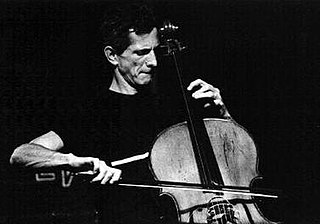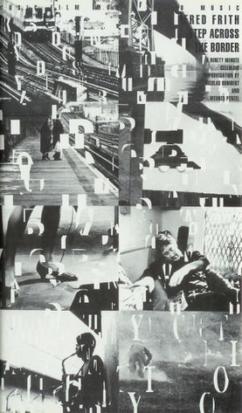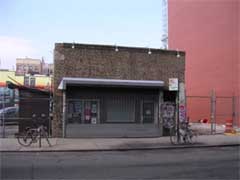
Jeremy Webster "Fred" Frith is an English multi-instrumentalist, composer, and improviser. Probably best known for his guitar work, Frith first came to attention as one of the founding members of the English avant-rock group Henry Cow. He was also a member of the groups Art Bears, Massacre, and Skeleton Crew. He has collaborated with a number of prominent musicians, including Robert Wyatt, Derek Bailey, the Residents, Lol Coxhill, John Zorn, Brian Eno, Mike Patton, Lars Hollmer, Bill Laswell, Iva Bittová, Jad Fair, Kramer, the ARTE Quartett, and Bob Ostertag. He has also composed several long works, including Traffic Continues and Freedom in Fragments. Frith produces most of his own music, and has also produced many albums by other musicians, including Curlew, the Muffins, Etron Fou Leloublan, and Orthotonics.

Thomas Henry Corra, better known as Tom Cora, was an American cellist and composer, best known for his improvisational performances in the field of experimental jazz and rock. He recorded with John Zorn, Butch Morris, and the Ex, and was a member of Curlew, Third Person and Skeleton Crew.

Skeleton Crew was an American experimental rock and jazz group from 1982 to 1986, comprising core members Fred Frith and Tom Cora, with Zeena Parkins joining later. Best known for their live improvisation performances where they played various instruments simultaneously, they also recorded two studio albums Learn to Talk (1984) and The Country of Blinds (1986). The group drew on music and themes from a number of sources, including world music, left-wing politics and pre-recorded tapes.

Zeena Parkins is an American composer and multi-instrumentalist active in experimental, free improvised, contemporary classical, and avant-jazz music; she is known for having "reinvented the harp". Parkins performs on standard harps, several custom electric harps, piano, and accordion. She is a 2019 Guggenheim Fellow and professor in the Music Department at Mills College.

The Henry Cow Legend is the debut album of British avant-rock group Henry Cow. It was recorded at Virgin Records' Manor studios over three weeks in May and June 1973, mixed in July 1973, and released in September 1973.

Guitar Solos is the debut solo album of English guitarist, composer, and improviser Fred Frith. It was recorded while Frith was still a member of the English experimental rock group Henry Cow and was released in the United Kingdom on LP record by Caroline Records in October 1974. The album comprises eight tracks of unaccompanied and improvised music played on prepared guitars by Frith without any overdubbing.
Keep the Dog was an American-based experimental rock touring band from New York City formed in 1989 by English multi-instrumentalist, composer and improvisor Fred Frith. The sextet was conceived as a review band for performing selections of Frith's repertoire of compositions from the previous 15 years.

That House We Lived In is a double live album by American experimental rock band Keep the Dog. It comprises material from their final European tour in 1991 and was released by Fred Frith on his own Fred Records in 2003.

Gravity is a 1980 solo album by English guitarist and composer Fred Frith. It was Frith's second solo album, and his first since Henry Cow disbanded in 1978. It was originally released in the United States on the Residents' Ralph Records, as the first of three solo albums Frith would record for the label. Gravity has been described as an avant-garde "dance" record that draws on rhythm and dance from folk music across the world.

Speechless is a 1981 solo album by English guitarist, composer and improviser Fred Frith of the group Henry Cow. It was Frith's third solo album, and was originally released in the United States on LP record on the Residents' Ralph record label. It was the second of three solo albums Frith made for the label.

Live in Japan, subtitled "The Guitars on the Table Approach", is a 1982 double live album by English guitarist, composer and improvisor Fred Frith. It was recorded during an improvised solo performance tour of Japan in July 1981. The double album was a limited edition release of 1,000 by Recommended Records Japan on two LP records in a black corrugated box containing posters, artwork and booklets in English and Japanese. It was also released as two single LPs, entitled Live in Japan, Vol. 1 and Live in Japan, Vol. 2. The single LP cover art was taken from the inner double LP gatefold cover.

Fred Frith appears on over 400 recordings. This is a selection from bands he was/is a member of, collaborations with other bands and musicians, and his solo recordings. The year indicates when the album was first released. For a comprehensive discography, see the Discography of Fred Frith by Michel Ramond, Patrice Roussel and Stephane Vuilleumier.
Death Ambient is an American experimental and ambient music trio comprising Kato Hideki, Ikue Mori, and Fred Frith (guitar). The group was formed by Kato and Mori in 1995 and recorded three albums: Death Ambient (1995) Synaesthesia (1999), Drunken Forest (2007) with guest Jim Pugliese (percussion).

Step Across the Border is a 1990 avant-garde documentary film on English guitarist, composer and improviser Fred Frith. It was written and directed by Nicolas Humbert and Werner Penzel and released in Germany and Switzerland. The film was screened in cinemas in North America, South America, Europe and Japan, and on television in the United States, Germany, Switzerland, Austria and France. It was also released on VHS by RecRec Music (Switzerland) in 1990, and was later released on DVD by Winter & Winter Records (Germany) in 2003.

The Top of His Head is a soundtrack by English guitarist, composer and improvisor Fred Frith, of the 1989 Canadian comedy-drama film, The Top of His Head. Frith wrote and composed all the music, with the exception of "This Old Earth", which was written and sung by Jane Siberry, and a cover of "The Way You Look Tonight". The music was recorded at l'Office National du Film, Montreal, Quebec, Canada in August and September 1988, and was released on LP and CD in 1989 by the Belgian independent label, Crammed Discs. The CD release contained two extra tracks, "Driving to the Train" and "The Long Drive".
Shelley Hirsch is an American vocalist, performance artist, composer, improviser, and writer. She won a DAAD Residency Grant in Berlin 1992, a Prix Futura award in 1993, and multiple awards from Creative Capital, the Foundation for Contemporary Arts, the New York State Council for the Arts, four from NYFA and six from Harvestworks Digital Media Arts Center. She was a recipient of the Guggenheim Fellowship in Music Composition in 2017.

Tonic was a music venue located in New York City founded by Melissa Caruso Scott and John Scott. First opened in 1998, it described itself as supporting "avant garde, creative and experimental music" and known for its commitment to musical integrity. Tonic was a former kosher winery and after opening quickly became a focal point of the downtown avant-garde scene. The small and unassuming building provided a sense of intimacy by setting the performers within arms length of the audience. Tonic also doubled as a place for a variety of musicians to record live.

Michihiro Sato (佐藤通弘, Satō Michihiro; surname Sato; name sometimes listed as Sato Michihiro;, is a prominent Japanese player of the Tsugaru-jamisen.

Godard/Spillane is a compilation album by American composer and saxophonist/multi-instrumentalist John Zorn consisting of music created through Zorn's file-card compositional process. The composition "Godard", a tribute to French film-maker Jean-Luc Godard whose jump-cut technique inspired Zorn's compositional approach, on the French tribute album Jean-Luc Godard|Godard ça vous chante? in 1986 issued by the French Nato label. "Spillane" was first released on Zorn's Nonesuch Records album Spillane in 1987, and "Blues Noël" was first released on the compilation album Joyeux Noël - Merry Christmas Everybody! on Nato in 1987.

Propaganda is a studio album by English guitarist, composer and improvisor Fred Frith. It comprises 21 pieces for dance written by Frith and commissioned by Matthew Maguire for the Creation Production Company. It was first performed at La Mama ETC in New York City in May 1987. The suite was recorded by Kramer at Noise New York in April 1987 and released on Side 4 of the LP release of Frith's 1988 solo album, The Technology of Tears. It was omitted from the CD releases of the album.

















